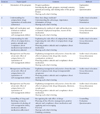Abstract
Purpose
This study was to examine the effects of tailored drug-related side effects management program using video designed to help patients with schizophrenia with self-control ability of drug-related side effects, attitude, and adherence to medication.
Methods
A non-equivalent control group, pretest-posttest design was used. The participants were 51 patients with schizophrenia, 26 in the experimental group and 25 in the control group. The tailored drug-related side effects management program using video was conducted for the experimental group twice a week for 60 minutes/session for 4 weeks. The self-control ability for drug-related side effects, attitude and adherence of medication were measured before and after the experiment. Data were analyzed by using IBM SPSS/WIN 20.0 program.
Figures and Tables
References
1. Sadock BJ, Sadock VA. Kaplan & Sadock Synopsis of psychiatry. 10th ed. Philadelphia, PA, US: Wolters Kluwer I Lippincott Williams & Wilkins;2007. p. 1470.
2. Ministry of Health and Welfare. The 2011 epidemiological survey of mental disorders in Korea. Seoul: Author;2011.
3. Usher K. Taking neuroleptic medications as the treatment for schizophrenia: a phenomenological study. Int J Ment Health Nurs. 2008; 10(3):145–155. http://dx.doi.org/10.1046/j.1440-0979.2001.00205.x.

4. Kim JH, Yoon JH, Lee JY, No KH, Hong SK, Yoon SC, et al. Subjective quality of life schizophrenic patients receiving atypical antipsychotics. J Korean Neuropsychiatr Assoc. 2003; 42(2):222–228.
5. Silva de Lima M, de Jesus MJ, Breier A, Maria CA, Pondé DSE, Hotopf M. Quality of life in schizophrenia: a multicenter, randomized, naturalistic, controlled trial comparing Olanzapine to first-generation antipsychotic. J Clin Psychiatry. 2005; 66(7):831–838.
6. Jung HY, Joo YH, Shin HK, Chung EK, Kang UG, Roh MS, et al. A validation study of Korean-version of Liverpool University Neuroleptic Side Effect Rating Scale (LUNSERS)-Liverpool University Neuroleptic Side Effect Rating Scale (LUNSERS). J Korean Neuropsychiatr Assoc. 2002; 41(1):138–145.
7. Chang JG, No DY, Kim CY. Recent trends of antipsychotics polypharmacy in schizophrenia. Korean J Psychopharmacol. 2013; 24(4):137–146.
8. Seo MA, Min SK. Facters influencing medication compliance in persons with schizophrenia in community. J Korean Acad Psychiatr Ment Health Nurs. 2005; 14(1):23–32.
9. Kang MO. Quality of life side effect of antipsychotics attitude toward drug of mentally disordered. [Seoul]: Ewha Womans University;2010. 68. [master's thesis].
10. Shon MJ. Self management medication and symptom. Daegu: Psychiatric Rehabilitation;1999. p. 229.
11. Thieda P, Beard S, Richter A, Kane J. An economic review of compliance with medication therapy in the treatment of schizophrenia. Psychiatr Serv. 2003; 54(4):508–516.

12. Song EJ. Lived experience of the women with schizophrenia taking antipsychotic medication. J Korean Acad Nurs. 2011; 41(3):382–392. http://dx.doi.org/10.4040/jkan.2011.41.3.382.

13. Ryu SH. Subjective quality of life in patients with schizophrenia receiving antipsychotics: relationship among subjective quality of life, drug attitude, and side-effect profiles of drugs. Korean J Psychopharmacol. 2005; 16(1):42–51.
14. Hofer A, Kemmler G, Eder U, Edinger M, Hummer M, Fleischhacker WW. Quality of life in schizophrenia: the impact of psychopathology, attitude toward medication, and side effects. J Clin Psychiatry. 2004; 65(7):932–939.
15. Verdoux A, Lengronne J, Liraud F, Gonzales B, Assens F, Abalan F, et al. Medication adherence in psychosis: predictors and impact on outcome. A 2-year follow-up of first-admitted subjects. Acta Psychiatr Scand. 2000; 102(3):203–210.

16. Naber D, Moritz M, Lambert M, Rajonk F, Holtbach R, Mass R, et al. Improvement of schizophrenic patients' subjective well-being under atypical antipsychotics drugs. Schizophr Res. 2001; 50(1):79–88.

17. Seo MA, Kim HR. Effectiveness of an 'integrated medication adherence enhancement program for persons with schizophrenia' by using online education contents. Korean J Psychopharmacol. 2009; 20(1):22–31.
18. Shon KH. Effectiveness of a Web-based learning program for medication and symptom management education of the schizophrenia patient. J Korean Acad Soc Nurs Educ. 2009; 15(2):285–292.

19. Son MJ. The efficacy of medication and symptom management education for persons with mental disorder. Korean J Clin Psychol. 2004; 23(4):851–871.
20. Hwang ES. Effect of a educational program for medication & symptom self-management on schizophrenic in-patients [master's thesis]. [Chuncheon]: Kangwon National University;2003. 75.
21. Kim KG, Buen YT. Social and independent living skills: medication management module: patient workbook. Seoul: Hana Medicine;1996. p. 100.
22. Hogan TP, Awad AG, Eastwood R. A self-report scale predictive of drug compliance in schizophrenics: reliability and discriminative validity. Psychol Med. 1983; 13(1):177–183.

23. Yoon BH, Sea YW, Bae SO, Lee ES, Lee HY. Subjective response to atypical and typical antipsychotics in schizophrenic inpatients. Br J Psychiatry. 2002; 8(2):298–304.

24. Shin GS. Effect of home visit education, on the drug compliance for chronic schizophrenics in house and the care-giver's role. [Chuncheon]: Kangwon National University;2001. 100. [mater's thesis].
25. Lee CS, Kim SJ, Kim AK, Kweon YR. The Effect of integrated mental health care program on knowledge and practice related to drug and symptom management, and problem solving ability for schizophrenic patients and their families. J Korean Acad Psychiatr Ment Health Nurs. 2007; 16(3):276–286.
26. Lee JE, Bae JY, Lm SB. Review of nursing research on psychotropic drugs in Korea. J Korean Acad Public Health Nurs. 2013; 27(2):338–356. http://dx.doi.org/10.5932.

27. Kim JE, Moon JJ, Kim MH, Kim WJ, Park MK, Song TH, et al. Effects of psychoeducation program on insight and treatment Aatitudes in patirnts with schizophrenia. schizophreniform disorder, and schizoaffective disorder. Korean J Psychopharmacol. 2010; 21(2):87–94.
28. Chan SW, Yip B, Tso S, Cheng BS, Tom W. Evaluation of a psychoeducation program for Chinese clients with schizophrenia and their family caregivers. Patient Educ Couns. 2009; 75(1):67–76.

29. Roh D, Chang JG, Kim CY. Improving medication adherence in patients with severe mental illness. Korean J Psychopharmacol. 2012; 23:155–165.




 PDF
PDF ePub
ePub Citation
Citation Print
Print






 XML Download
XML Download